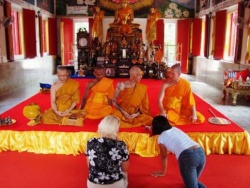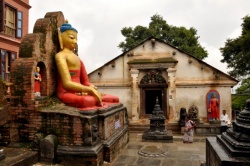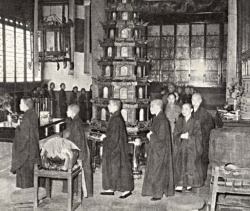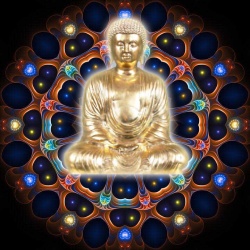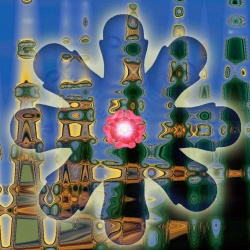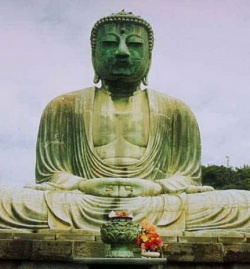Difference between revisions of "Visakha Migaramata — Migara's Mother"
(Created page with " At the top, Beggars, of those of my {{Wiki|Female}} Upasakas who is a giver (dayikanam) is Visakha Migaramata (Migara's Mother). Visakha Migaramata —...") |
|||
| (One intermediate revision by the same user not shown) | |||
| Line 1: | Line 1: | ||
| + | <nomobile>{{DisplayImages|2689|1270|2104|557|3409|2822|3871|4288|182}}</nomobile> | ||
| Line 5: | Line 6: | ||
| − | + | At the top, Beggars, of those of my {{Wiki|Female}} [[Upasakas]] who is a giver ([[dayikanam]]) is [[Visakha Migaramata]] ([[Migara's Mother]]). | |
| − | At the top, Beggars, of those of my {{Wiki|Female}} [[Upasakas]] who is a giver (dayikanam) is [[Visakha]] | + | [[Visakha Migaramata]] — [[Migara's Mother]] |
| − | [[Visakha]] | ||
(DPPN: The chief among the {{Wiki|female}} [[lay disciples]] of the [[Buddha]] and declared by him to be foremost among those who ministered to the Order (dayikanam). | (DPPN: The chief among the {{Wiki|female}} [[lay disciples]] of the [[Buddha]] and declared by him to be foremost among those who ministered to the Order (dayikanam). | ||
| Line 25: | Line 25: | ||
Later, when, at [[Pasenadi's]] request, [[Bimbisara]] sent [[Dhananjaya]] to live in [[Kosala]], [[Visakha]] accompanied her [[parents]] and lived in [[Saketa]]. | Later, when, at [[Pasenadi's]] request, [[Bimbisara]] sent [[Dhananjaya]] to live in [[Kosala]], [[Visakha]] accompanied her [[parents]] and lived in [[Saketa]]. | ||
| − | The messengers, sent by Migara of [[Savatthi]] to find a suitable bride for his son Pannavaddhana, saw [[Visakha]] on her way to the lake to bathe on a feast-day. | + | The messengers, sent by [[Migara]] of [[Savatthi]] to find a suitable bride for his son [[Pannavaddhana]], saw [[Visakha]] on her way to the lake to bathe on a feast-day. |
At that [[moment]] there was a great shower. | At that [[moment]] there was a great shower. | ||
| Line 39: | Line 39: | ||
The messengers [[offered]] her a bouquet of [[flowers]], which she accepted as a proposal of [[marriage]], and then went onto her father's house. | The messengers [[offered]] her a bouquet of [[flowers]], which she accepted as a proposal of [[marriage]], and then went onto her father's house. | ||
| − | The messengers followed and laid Punnavaddhana's suit before [[Dhananjaya]]. The proposal was accepted and confirmed by an exchange of letters. | + | The messengers followed and laid [[Punnavaddhana's]] suit before [[Dhananjaya]]. The proposal was accepted and confirmed by an exchange of letters. |
| − | When [[Wikipedia:Pasenadi|Pasenadi]] heard of it, he [[offered]] to accompany Punnavaddhana to [[Saketa]], as a mark of signal favor. | + | When [[Wikipedia:Pasenadi|Pasenadi]] heard of it, he [[offered]] to accompany [[Punnavaddhana]] to [[Saketa]], as a mark of signal favor. |
| − | [[Dhananjaya]] welcomed the [[king]] and his retinue, Migara, Punnavaddhana and their followers, with all [[honor]], | + | [[Dhananjaya]] welcomed the [[king]] and his retinue, [[Migara]], [[Punnavaddhana]] and their followers, with all [[honor]], |
attending personally to all the details of [[hospitality]]. He persuaded the [[king]] to stay with him during the rains, providing all that was necessary. | attending personally to all the details of [[hospitality]]. He persuaded the [[king]] to stay with him during the rains, providing all that was necessary. | ||
| − | Five hundred goldsmiths were engaged to make the Mahalatapasadhana (ornament) for the bride; three months passed, but it was still unfinished. | + | Five hundred goldsmiths were engaged to make the [[Mahalatapasadhana]] (ornament) for the bride; three months passed, but it was still unfinished. |
The supply of firewood ran out, and orders were given that the [[wood]] of dilapidated houses should be used. | The supply of firewood ran out, and orders were given that the [[wood]] of dilapidated houses should be used. | ||
| Line 77: | Line 77: | ||
But [[Visakha]], repulsed by their [[nudity]], refused to pay them homage. | But [[Visakha]], repulsed by their [[nudity]], refused to pay them homage. | ||
| − | The [[Niganthas]] urged that she should be sent away, but Migara bided his time. | + | The [[Niganthas]] urged that she should be sent away, but [[Migara]] bided his time. |
| − | One day, as Migara was eating, while [[Visakha]] stood fanning him, a [[monk]] was seen [[standing]] outside his house. | + | One day, as [[Migara]] was eating, while [[Visakha]] stood fanning him, a [[monk]] was seen [[standing]] outside his house. |
| − | [[Visakha]] stood aside, that Migara might see him, but as Migara continued to eat without noticing the [[monk]], she said to the [[latter]], "Pass on, Sir, my father-in-law eats stale fare." | + | [[Visakha]] stood aside, that Migara might see him, but as [[Migara]] continued to eat without noticing the [[monk]], she said to the [[latter]], "Pass on, Sir, my father-in-law eats stale fare." |
Migara was [[angry]] and threatened to send her away, but, at her request, the {{Wiki|matter}} was referred to her sponsors. | Migara was [[angry]] and threatened to send her away, but, at her request, the {{Wiki|matter}} was referred to her sponsors. | ||
| Line 89: | Line 89: | ||
[[Visakha]] then gave orders that preparations should be made for her return to her [[parents]]. | [[Visakha]] then gave orders that preparations should be made for her return to her [[parents]]. | ||
| − | But Migara begged her [[forgiveness]] which she granted, on [[condition]] that he would invite to the house the [[Buddha]] and his [[monks]]. | + | But [[Migara]] begged her [[forgiveness]] which she granted, on [[condition]] that he would invite to the house the [[Buddha]] and his [[monks]]. |
This he did, but, owing to the influence of the [[Niganthas]], he left [[Visakha]] to entertain them, and only consented to hear the [[Buddha's]] {{Wiki|sermon}} at the end of the meal from behind a curtain. | This he did, but, owing to the influence of the [[Niganthas]], he left [[Visakha]] to entertain them, and only consented to hear the [[Buddha's]] {{Wiki|sermon}} at the end of the meal from behind a curtain. | ||
| Line 95: | Line 95: | ||
At the conclusion of this {{Wiki|sermon}}, however, he became a [[sotapanna]]. His [[gratitude]] towards [[Visakha]] was [[boundless]]; henceforth she was to be considered as his mother and to receive all the [[honor]] due to a mother; from this time onwards she was called Migrarmata. | At the conclusion of this {{Wiki|sermon}}, however, he became a [[sotapanna]]. His [[gratitude]] towards [[Visakha]] was [[boundless]]; henceforth she was to be considered as his mother and to receive all the [[honor]] due to a mother; from this time onwards she was called Migrarmata. | ||
| − | Migara got made for her everyday use an ornament called ghanamatthaka, at a cost of one hundred thousand. | + | Migara got made for her everyday use an ornament called [[ghanamatthaka]], at a cost of one hundred thousand. |
| − | On the day of the presentation of this ornament, Migara held for her a special {{Wiki|festival}} in her [[honor]], and she was made to bathe in sixteen pots of perfumed [[water]]. | + | On the day of the presentation of this ornament, [[Migara]] held for her a special {{Wiki|festival}} in her [[honor]], and she was made to bathe in sixteen pots of perfumed [[water]]. |
[[Visakha]] had ten sons and ten daughters, each of whom had a similar number of children, and so on down to the fourth generation. | [[Visakha]] had ten sons and ten daughters, each of whom had a similar number of children, and so on down to the fourth generation. | ||
| Line 115: | Line 115: | ||
[[food]] for [[monks]] coming into [[Savatthi]]; [[food]] for those going out; [[food]] for the sick; [[food]] for those who wait on the sick; [[medicine]] for the sick; a [[constant]] supply of rice-gruel for any needing it; and bathing [[robes]] for the [[nuns]]. | [[food]] for [[monks]] coming into [[Savatthi]]; [[food]] for those going out; [[food]] for the sick; [[food]] for those who wait on the sick; [[medicine]] for the sick; a [[constant]] supply of rice-gruel for any needing it; and bathing [[robes]] for the [[nuns]]. | ||
| − | With the construction of the [[Migaramatupasada]] | + | With the construction of the [[Migaramatupasada]] [[Migara's Mother's]] terraced abode — most often translated "The Palace of [[Migara's]] Mother" |
| − | + | in the [[Pubbarama]] [[Visakha's]] [[ambitions]] were fulfilled, and it is said that when the [[monastery]] was completed and the {{Wiki|festival}} of opening in progress, | |
as the evening drew on she walked round the [[monastery]] accompanied by her children, her grandchildren and her great-grandchildren, and in five [[stanzas]] [[sang]] her [[joy]], saying 'Now is entirely fulfilled the [[prayer]] which I prayed in times of yore.' | as the evening drew on she walked round the [[monastery]] accompanied by her children, her grandchildren and her great-grandchildren, and in five [[stanzas]] [[sang]] her [[joy]], saying 'Now is entirely fulfilled the [[prayer]] which I prayed in times of yore.' | ||
| Line 124: | Line 124: | ||
The [[monks]] herd her sing and told the [[Buddha]]; he related to them how, in the time of [[Padumuttara Buddha]], | The [[monks]] herd her sing and told the [[Buddha]]; he related to them how, in the time of [[Padumuttara Buddha]], | ||
| − | [[Visakha]] had been the [[friend]] of the [[principal]] women benefactors of that [[Buddha]]. In the time of [[Kassapa Buddha]] she was Sanghadasi, youngest of the seven daughters of [[Kiki]], | + | [[Visakha]] had been the [[friend]] of the [[principal]] women benefactors of that [[Buddha]]. |
| + | |||
| + | In the time of [[Kassapa Buddha]] she was Sanghadasi, youngest of the seven daughters of [[Kiki]], | ||
and for long after her [[marriage]] she gave [[alms]] and performed other good works with her sisters. | and for long after her [[marriage]] she gave [[alms]] and performed other good works with her sisters. | ||
| − | According to the Viharavimanavatthu, [[Visakha]] was born, after [[death]] among the Nimmanaratideva | + | According to the [[Viharavimanavatthu]], [[Visakha]] was born, after [[death]] among the [[Nimmanaratideva]] |
| − | The [[Gods]] of Creation] as the [[consort]] of the [[deva-king]] [[Sunimmita]]. | + | The [[Gods]] of Creation] as the [[consort]] of the [[deva-king]] [[Sunimmita]]. |
| − | like [[Sakka]] and [[Anathapindika]], will enjoy one hundred and thirty-one [[kappas]] of [[happiness]] in the [[Brahma worlds]] before she finally passes away into [[Nibbana]]. | + | [[Buddhaghosa]] says that [[Visakha]], like [[Sakka]] and [[Anathapindika]], will enjoy one hundred and thirty-one [[kappas]] of [[happiness]] in the [[Brahma worlds]] before she finally passes away into [[Nibbana]]. |
The [[books]] contain numerous [[suttas]] [[preached]] by the [[Buddha]] to [[Visakha]] during her frequent visits to him, chief among such [[suttas]] being the famous [[discourse]] on the keeping of the [[Uposatha]] [A.i.205], | The [[books]] contain numerous [[suttas]] [[preached]] by the [[Buddha]] to [[Visakha]] during her frequent visits to him, chief among such [[suttas]] being the famous [[discourse]] on the keeping of the [[Uposatha]] [A.i.205], | ||
| − | the [[discourse]] of the eight qualities which win for women power in this [[world]] and power and [[happiness]] in the next [A.iv.269], and eight qualities which win for a woman [[birth]] among the Manapakayika-devas [A.iv.267] | + | the [[discourse]] of the eight qualities which win for women power in this [[world]] and power and [[happiness]] in the next [A.iv.269], and eight qualities which win for a woman [[birth]] among the [[Manapakayika-devas]] [A.iv.267] |
The [[Gods]] of Lovely [[Form]] — able to assume any {{Wiki|color}} radiance, produce any [[sound]], and obtain any [[happiness]] — with a SNAP of the fingers. | The [[Gods]] of Lovely [[Form]] — able to assume any {{Wiki|color}} radiance, produce any [[sound]], and obtain any [[happiness]] — with a SNAP of the fingers. | ||
Latest revision as of 07:31, 29 February 2016
At the top, Beggars, of those of my Female Upasakas who is a giver (dayikanam) is Visakha Migaramata (Migara's Mother).
Visakha Migaramata — Migara's Mother
(DPPN: The chief among the female lay disciples of the Buddha and declared by him to be foremost among those who ministered to the Order (dayikanam).
Her father was Dhananjaya, son of Mendaka, and her mother Sumana. She was born in the city of Bhaddiya in Anga.
When she was seven years old, the Buddha visited Bhaddiya with a large company of monks, out of compassion for the brahmin Sela and others.
Mendaka gave Visakha five hundred companions, five hundred slaves, and five hundred chariots, that she might visit the Buddha.
She stopped the chariots some distance away and approached the Buddha on foot.
He preached to her and she became a sotapanna.
For the next fortnight Mendaka invited the Buddha and his monks daily to his house, where he fed them.
Later, when, at Pasenadi's request, Bimbisara sent Dhananjaya to live in Kosala, Visakha accompanied her parents and lived in Saketa.
The messengers, sent by Migara of Savatthi to find a suitable bride for his son Pannavaddhana, saw Visakha on her way to the lake to bathe on a feast-day.
At that moment there was a great shower.
Visakha's companions ran for shelter, but Visakha herself, walking at her usual pace, came to the place where the messengers, already greatly impressed, were awaiting her.
When they asked her why she did not run to seek shelter and so preserve her clothes, she answered that she had plenty of clothes in the house, but that if she ran she might damage a limb which would be a great loss.
"Unmarried girls," she said, "are like goods awaiting sale, they must not be disfigured."
The messengers offered her a bouquet of flowers, which she accepted as a proposal of marriage, and then went onto her father's house.
The messengers followed and laid Punnavaddhana's suit before Dhananjaya. The proposal was accepted and confirmed by an exchange of letters.
When Pasenadi heard of it, he offered to accompany Punnavaddhana to Saketa, as a mark of signal favor.
Dhananjaya welcomed the king and his retinue, Migara, Punnavaddhana and their followers, with all honor,
attending personally to all the details of hospitality. He persuaded the king to stay with him during the rains, providing all that was necessary.
Five hundred goldsmiths were engaged to make the Mahalatapasadhana (ornament) for the bride; three months passed, but it was still unfinished.
The supply of firewood ran out, and orders were given that the wood of dilapidated houses should be used.
This wood lasted for a fortnight, and then the storehouses containing clothes were opened, the cloths soaked in oil and used for cooking the food.
The ornament was finished in four months.
Dhananjaya gave his daughter, as dowry, five hundred carts full of money, five hundred with vessels of gold,
five hundred each of silver, copper, various silks, ghee, rice husked and winnowed; also ploughs, ploughshares, and other farm implements,
five hundred carts with three slave women in each, everything being provided for them.
The cattle given by him filled an enclosure three quarters of a league in length and eight rods across, standing shoulder to shoulder, and in addition to these,
sixty thousand bulls and sixty thousand milch cows escaped from their stalls and joined the heard already gifted to her [this likely no accident, but a staged show of indifference to wealth — mo] ...
On the following day Dhananjaya appointed eight householders to be sponsors to his daughter and to enquire into any charges which might be brought against her.
When she left, Dhananjaya allowed any inhabitants of his fourteen tributary villages to accompany her if they so wished.
As a result the villages were left empty; but Migara, fearing that he should have to feed them, drove most of them back.
Visakha entered Savatthi standing in her chariot, so that all might see her glory. The citizens showered gifts on her, but these she distributed among the people.
Migara was a follower of the Niganthas, and soon after Visakha's arrival in his house, he sent for them and told her to minister to them.
But Visakha, repulsed by their nudity, refused to pay them homage.
The Niganthas urged that she should be sent away, but Migara bided his time.
One day, as Migara was eating, while Visakha stood fanning him, a monk was seen standing outside his house.
Visakha stood aside, that Migara might see him, but as Migara continued to eat without noticing the monk, she said to the latter, "Pass on, Sir, my father-in-law eats stale fare."
Migara was angry and threatened to send her away, but, at her request, the matter was referred to her sponsors.
They enquired into the several charges brought against her and adjudged her not guilty.
Visakha then gave orders that preparations should be made for her return to her parents.
But Migara begged her forgiveness which she granted, on condition that he would invite to the house the Buddha and his monks.
This he did, but, owing to the influence of the Niganthas, he left Visakha to entertain them, and only consented to hear the Buddha's sermon at the end of the meal from behind a curtain.
At the conclusion of this sermon, however, he became a sotapanna. His gratitude towards Visakha was boundless; henceforth she was to be considered as his mother and to receive all the honor due to a mother; from this time onwards she was called Migrarmata.
Migara got made for her everyday use an ornament called ghanamatthaka, at a cost of one hundred thousand.
On the day of the presentation of this ornament, Migara held for her a special festival in her honor, and she was made to bathe in sixteen pots of perfumed water.
Visakha had ten sons and ten daughters, each of whom had a similar number of children, and so on down to the fourth generation.
Before her death, at the age of one hundred and twenty, she had eighty-four thousand and twenty direct lineal descendents, all living. She herself kept, all her life, the appearance of a girl of sixteen.
She had the strength of five elephants,
and it is said that once she took the trunk of an elephant, which was sent to test her, between her two fingers and forced him back on his haunches.
Visakha owned such a great reputation for bringing good fortune that the people of Savatthi always invited her to their houses on festivals and holidays.
Visakha fed five hundred monks daily at her house. In the afternoon she visited the Buddha, and, after listening to his sermon, would go round the monastery inquiring into the needs of the monks and nuns ...
Visakha begged for, and was granted, eight boons by the Buddha: that as long as she lived she be allowed to give robes to the members of the order for the rainy season;
food for monks coming into Savatthi; food for those going out; food for the sick; food for those who wait on the sick; medicine for the sick; a constant supply of rice-gruel for any needing it; and bathing robes for the nuns.
With the construction of the Migaramatupasada Migara's Mother's terraced abode — most often translated "The Palace of Migara's Mother"
in the Pubbarama Visakha's ambitions were fulfilled, and it is said that when the monastery was completed and the festival of opening in progress,
as the evening drew on she walked round the monastery accompanied by her children, her grandchildren and her great-grandchildren, and in five stanzas sang her joy, saying 'Now is entirely fulfilled the prayer which I prayed in times of yore.'
The monks herd her sing and told the Buddha; he related to them how, in the time of Padumuttara Buddha,
Visakha had been the friend of the principal women benefactors of that Buddha.
In the time of Kassapa Buddha she was Sanghadasi, youngest of the seven daughters of Kiki,
and for long after her marriage she gave alms and performed other good works with her sisters.
According to the Viharavimanavatthu, Visakha was born, after death among the Nimmanaratideva
The Gods of Creation] as the consort of the deva-king Sunimmita.
Buddhaghosa says that Visakha, like Sakka and Anathapindika, will enjoy one hundred and thirty-one kappas of happiness in the Brahma worlds before she finally passes away into Nibbana.
The books contain numerous suttas preached by the Buddha to Visakha during her frequent visits to him, chief among such suttas being the famous discourse on the keeping of the Uposatha [A.i.205],
the discourse of the eight qualities which win for women power in this world and power and happiness in the next [A.iv.269], and eight qualities which win for a woman birth among the Manapakayika-devas [A.iv.267]
The Gods of Lovely Form — able to assume any color radiance, produce any sound, and obtain any happiness — with a SNAP of the fingers.
Source
http://obo.genaud.net/backmatter/appendixes/personalities/visakha_migaramata.htm


